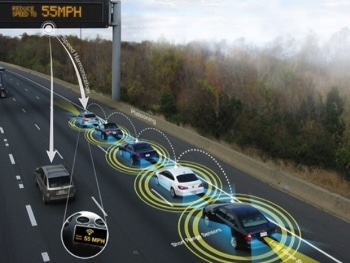Apr 26 2016
The Montana State University College of Engineering and the Western Transportation Institute are hosting a workshop to explore the possibility of developing a research program around autonomous and connected vehicles.
 A graphic depicts categories of collision avoidance technologies for autonomous vehicles. MSU researchers will consider the possibility of developing a research program around autonomous and connected vehicles at a workshop hosted by the College of Engineering and the Western Transportation Institute this week. Photo courtesy U.S. Department of Transportation.
A graphic depicts categories of collision avoidance technologies for autonomous vehicles. MSU researchers will consider the possibility of developing a research program around autonomous and connected vehicles at a workshop hosted by the College of Engineering and the Western Transportation Institute this week. Photo courtesy U.S. Department of Transportation.
Autonomous vehicles are self-driving, or driverless, cars equipped with radar, sensors, GPS and other technology that enables them to navigate without human input. Connected cars are equipped with internet access and/or a wireless local area network that connects the vehicle to devices, services or networks that can warn of traffic accidents, provide safety alerts, unlock car doors and perform other safety-related and data functions.
Vice President of Research and Economic Development Renee Reijo Pera has invited MSU deans, department heads and faculty to share their ideas and provide input at the workshop, which will be held from 7:45 a.m. to 11 a.m., Thursday April 28, at the Western Transportation Institute, 2327 University Way, Room 333.
“Research funding and opportunities in the field of automated vehicles/connected vehicles are on the rise,” Reijo Pera wrote in her invitation. “President Obama’s FY17 budget includes $4 billion for automated vehicles, and United States Department of Transportation Secretary Foxx announced DOT initiatives to accelerate vehicle safety innovations.”
Reijo Pera said the workshop will be a critical part of an analysis being performed by the COE and WTI to assess the strengths, weaknesses, opportunities and threats of moving forward with the program, with an overarching goal of identifying research areas in which MSU can successfully compete.
She added that the private sector – Google, Apple and Uber being at the forefront – is set to invest billions in connected vehicle development, which will require supportive technology and roads.
Interest in the workshop is strong across campus among MSU researchers and faculty in disciplines that include engineering, business, computer science, political science and others, said Steve Albert, director of the Western Transportation Institute.
Albert said those who attend the workshop will hear the latest in AV/CV research from national experts, then have the chance to identify and match emerging research opportunities to the research strengths at MSU. They will also work to develop ideas for multi-disciplinary research collaborations on the development of AV/CV technology.
“If we get everyone in the same room to brainstorm and evaluate ideas, I think we can identify niche areas of AV/CV research in which MSU can really excel,” Albert said.
One notable scheduled workshop speaker and session leader is Craig Shankwitz, research and development principal at MTS Systems Corporation and former director of the University of Minnesota Intelligent Vehicles Laboratory. Shankwitz will lead the development of a WTI research team.
In February, Shankwitz released a research statement on autonomous and connected vehicles announcing a “revolution in ground transportation” fueled by technology and demand. In his statement, Shankwitz pointed out that the current focus is primarily on testing driverless cars in urban areas.
There is opportunity in focusing on rural environments, where 40 percent of vehicle miles are traveled, Shankwitz said. Rural roads also lack local emergency services, have a high percentage of fatal crashes caused by high speeds, lack traffic signals at intersections and are victim to rapidly-changing weather and road conditions.
“Rural AV/CV technology is unlikely to attract the level of private investment that the urban AV/CV opportunity has; however, it is likely to attract a higher percentage of government investment because transportation leaders recognize that AV/CV technology has the potential to improve rural highway safety,” he said.
Shankwitz concluded that MSU is well-positioned to support the research and development of AV/CV, citing benefits such as the WTI, the Technology Transfer Office, the Transcend Research Facility and the university’s plan to increase graduate school enrollment, particularly among doctoral candidates.
“MSU and WTI together can lead the charge to simultaneously improve both rural highway safety and rural highway mobility in the U.S., and subsequently, the world,” Shankwitz said.
Presenting along with Shankwitz and Albert, are other experts in connected and autonomous vehicle technology and federal policy including: Mark Young, MSU associate vice president of research and economic development; Brett Gunnink, dean of the College of Engineering; and Brian Cronin, program manager of the Intelligent Transportation Systems Joint Program Office at the United States Department of Transportation.
Albert said the deployment of autonomous and connected vehicles on the road has far-reaching implications, many of which have yet to be considered.
“With our specialized knowledge of rural transportation technologies, WTI and MSU may be in an excellent position to develop AV/CV technologies that not only work in rural areas, but that actually improve travel and save lives,” he said.